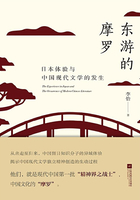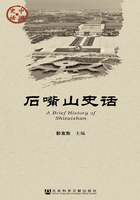On the ground floor, under the drawing-room, next to the entrance-hall, my father built his study. He had a semi-circular niche made in the wall, and stood a marble bust of his favorite dead brother Nikolai in it. This bust was made abroad from a death-mask, and my father told us that it was very like, because it was done by a good sculptor, according to his own directions.
He had a kind and rather plaintive face. The hair was brushed smooth like a child's, with the parting on one side. He had no beard or mustache, and his head was white and very, very clean. My father's study was divided in two by a partition of big bookshelves, containing a multitude of all sorts of books.
In order to support them, the shelves were connected by big wooden beams, and between them was a thin birch-wood door, behind which stood my father's writing-table and his old-fashioned semicircular arm-chair.
There are portraits of Dickens and Schopenhauer and Fet [6] as a young man on the walls, too, and the well-known group of writers of the Sovremennik [7] circle in 1856, with Turgenieff, Ostrovsky, Gontcharof, Grigorovitch, Druzhinin, and my father, quite young still, without a beard, and in uniform.
[6] Afanasyi Shenshin, the poet, who adopted his mother's name, Fet, for a time, owing to official difficulties about his birth-certificate. An intimate friend of Tolstoy's.
[7] "Sovremennik," or "Contemporary Review," edited by the poet Mekrasof, was the rallying-place for the "men of the forties," the new school of realists. Ostrovsky is the dramatist; Gontcharof the novelist, author of "Oblomof"; Grigorovitch wrote tales about peasant life, and was the discoverer of Tchekhof's talent as a serious writer.
My father used to come out of his bedroom of a morning--it was in a corner on the top floor--in his dressing-gown, with his beard uncombed and tumbled together, and go down to dress.
Soon after he would issue from his study fresh and vigorous, in a gray smock-frock, and would go up into the zala for breakfast. That was our dejeuner.
When there was nobody staying in the house, he would not stop long in the drawing-room, but would take his tumbler of tea and carry it off to his study with him.
But if there were friends and guests with us, he would get into conversation, become interested, and could not tear himself away.
At last he would go off to his work, and we would disperse, in winter to the different school-rooms, in summer to the croquet-lawn or somewhere about the garden. My mother would settle down in the drawing-room to make some garment for the babies, or to copy out something she had not finished overnight; and till three or four in the afternoon silence would reign in the house.
Then my father would come out of his study and go off for his afternoon's exercise. Sometimes he would take a dog and a gun, sometimes ride, and sometimes merely go for a walk to the imperial wood.
At five the big bell that hung on the broken bough of an old elm-tree in front of the house would ring and we would all run to wash our hands and collect for dinner.
He was very hungry, and ate voraciously of whatever turned up. My mother would try to stop him, would tell him not to waste all his appetite on kasha, because there were chops and vegetables to follow. "You'll have a bad liver again," she would say; but he would pay no attention to her, and would ask for more and more, until his hunger was completely satisfied. Then he would tell us all about his walk, where he put up a covey of black game, what new paths he discovered in the imperial wood beyond Kudeyarof Well, or, if he rode, how the young horse he was breaking in began to understand the reins and the pressure of the leg. All this he would relate in the most vivid and entertaining way, so that the time passed gaily and animatedly.
After dinner he would go back to his room to read, and at eight we had tea, and the best hours of the day began--the evening hours, when everybody gathered in the zala. The grown-ups talked or read aloud or played the piano, and we either listened to them or had some jolly game of our own, and in anxious fear awaited the moment when the English grandfather-clock on the landing would give a click and a buzz, and slowly and clearly ring out ten.
Perhaps mama would not notice? She was in the sitting-room, making a copy.
"Come, children, bedtime! Say good night," she would call.
"In a minute, Mama; just five minutes."
"Run along; it's high time; or there will be no getting you up in the morning to do your lessons."
We would say a lingering good night, on the lookout for any chance for delay, and at last would go down-stairs through the arches, annoyed at the thought that we were children still and had to go to bed while the grown-ups could stay up as long as ever they liked.















